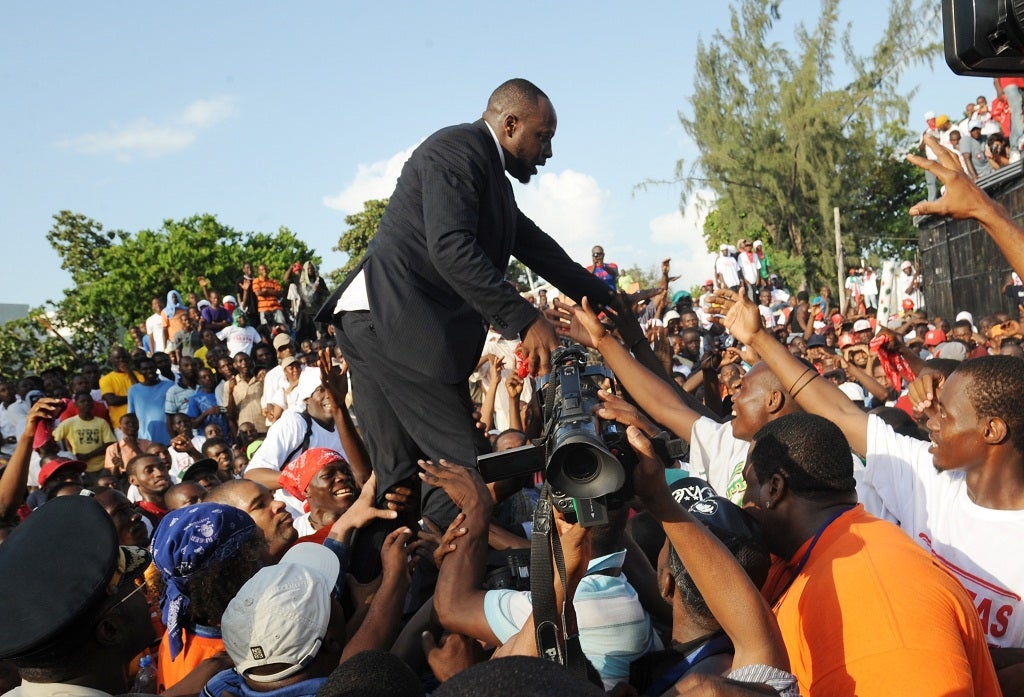The Independent's journalism is supported by our readers. When you purchase through links on our site, we may earn commission.
Jimmy Savile, Lance Armstrong, Wyclef Jean: would it be better for all if celebrities stayed out of charity?
It's not just recent history that gives celebrities in charity a bad name, many think mega-stars cause more problems than they solve

No question, laughter isn’t a particularly appropriate response to news that hip-hop star Wyclef Jean’s Haiti charity Yéle squandered much of its $16 million endowment – but this is surely one of those occasions where tragedy crosses into farce.
What on earth made Wyclef - who was born in Haiti - think it OK to pay himself $100,000 to play a gig at one of his own fundraisers? Or to put $24,000 of personal chauffeur expenses on account? Or to fly Lindsay Lohan from New Jersey to Chicago via private jet at a cost of $31,000?
This is just completely bananas. It’s like corruption scripted by Sacha Baron-Cohen. Two of the friends I told about Wyclef’s bizarre accountancy let out identical whoops of laughter, before a hand flew up to cover their mouths.
Yéle was, until 2010, just another small charity with a celebrity founder. The 7.0 magnitude earthquake that pulverised Haiti that year – killing 300,000 people – transformed it, quite literally overnight, into one of the most generously funded relief organisations in the region: in the first 24 hours after the disaster Wyclef raised $1million via Twitter.
But to spend money well after a humanitarian crisis is a task exponentially harder than raising it. Two years down the line in Haiti, the New York Times distressingly reveals, there’s hardly any sign of Yéle; a slum scheduled for renovation remains a slum; other projects were siphoned off to relatives; vast amounts spent on office space. All the while, Yéle employees ate magnificently - $500,000 was lavished on food and drink in 2010.
This tale of greed trumping good intentions puts the cap on a rotten month for celebrities and charity. Wyclef is joined in a triangle of shame by Jimmy Savile and Lance Armstrong, two men who apparently used fundraising as a shield, even in Savile’s case an outlet, for their own perversions. It’s hard to say whether the quick succession of these scandals will dim the public’s enthusiasm for celebrity-fronted funds – but you can see how they might.
The headless heart
What they certainly do is make the prospect of mounting any defence whatsoever of celebro-charity seem wholly unattractive.
And before I start to, it’s probably necessary to point out that many think we’d be better off without the whole circus. “The development buzz” generated by celebrities, says one academic, “is at times a headless heart”; one that meddles in a serious cause, gets bored, then moves on and forgets all about it.
You might remember Madonna's ill-fated sortie in Malawian education last year. Although Madge spent some £2.4 million through her trust, Raising Malawi, to build a school in the South-East African country – no more than foundations were ever laid. Cars and golf-club memberships were, on the other hand, secured for employees, and the partner of Madonna’s personal trainer, who headed the organisation, took a flight out of Malawi a richer man. Ouch.
So, would it be better for everyone if celebs kept their Red noses out of these things?
It’s complicated. First of all, to consider celebrities as a uniform group is misleading. While they’re predominantly sexy and often inter-marry, smartness levels of course vary. In Haiti (which many observers consider proof of the futility and destructiveness of international aid) there’s an interesting example of this: as Wyclef was busy giving orphanages goods they didn’t need and couldn’t use, Sean Penn’s organisation, J/P HRO, built up a good reputation – and was commended in the New York Times. Tellingly, it’s not under Penn’s name, nor is it run by him alone, but by a group of people who could reasonably be called experts.
Celebrity power
Then there’s a different issue to address. Celebrities are blessed with a huge power, but one there’s little obvious use for. Once a movie-star, musician or sports-person turns into a "celebrity" news starts to follow them wherever they go and whatever they do. To be able to set the agenda like that is a gift many would pay richly for.
Those celebs who choose to game the system a bit by attaching their name to slow-burn causes and issues that might not otherwise make the news - whether it’s nutrition, famine or inequality - shouldn't be condemned for it.
There’s bravery here. The simpler thing to do is sit back and not take the buckshot of cynicism that tends to greet Clooney when he talks about Sudan, or Richard Gere when he mentions Tibet. It’s a paradox that the only way people can really trust the charitable efforts of the Geres and Clooneys of this world is if we hear absolutely nothing about them – then, we assume, they’re “doing it for the right reasons”.
But then, perhaps, they’re also doing it wrong - not pimping their celebrity status for maximum exposure, funds and advocacy.
One thing’s for certain. Though we all care to some extent about problems in the world, pound-for-pound, it matters more that celebrities do.
You’re still allowed to hate Bono, though, if you want to.

Join our commenting forum
Join thought-provoking conversations, follow other Independent readers and see their replies